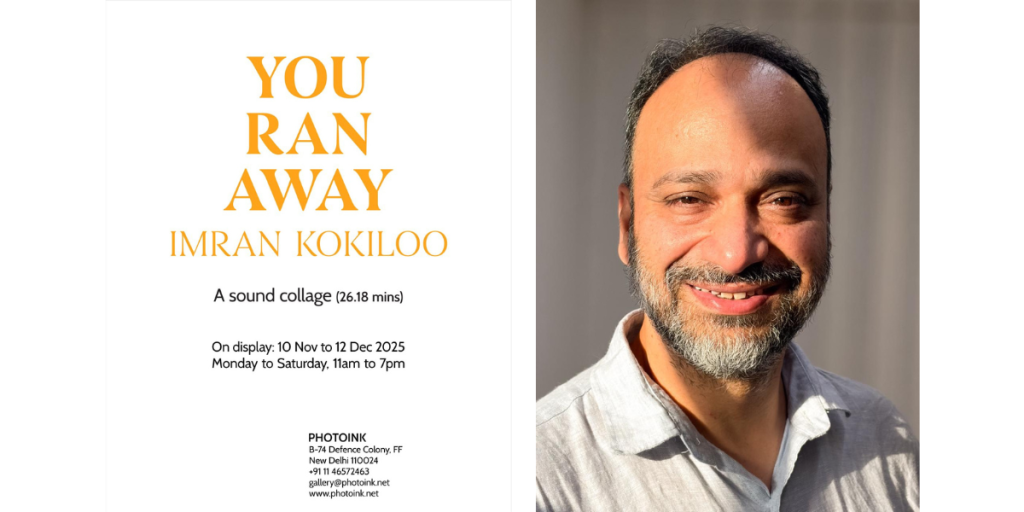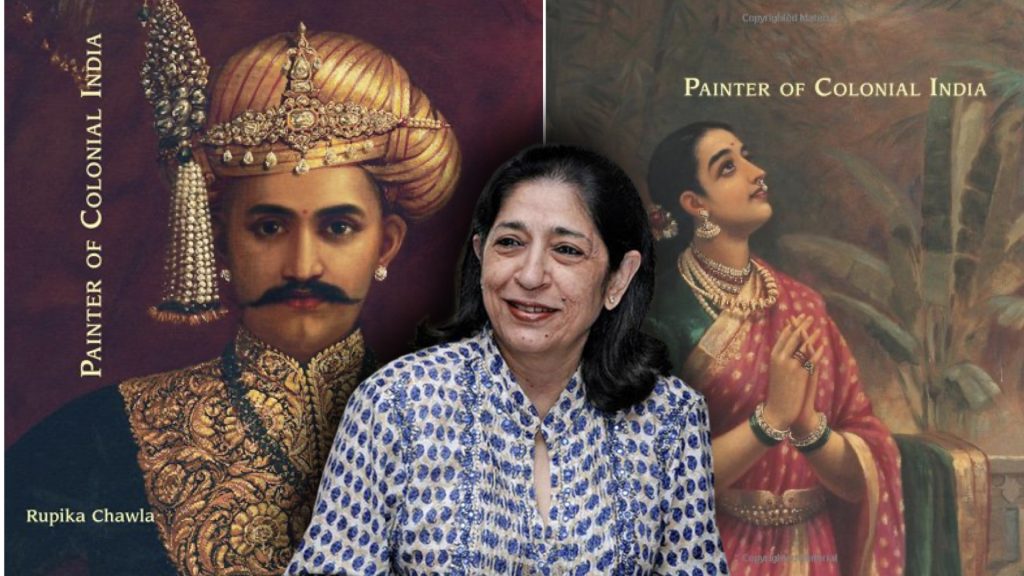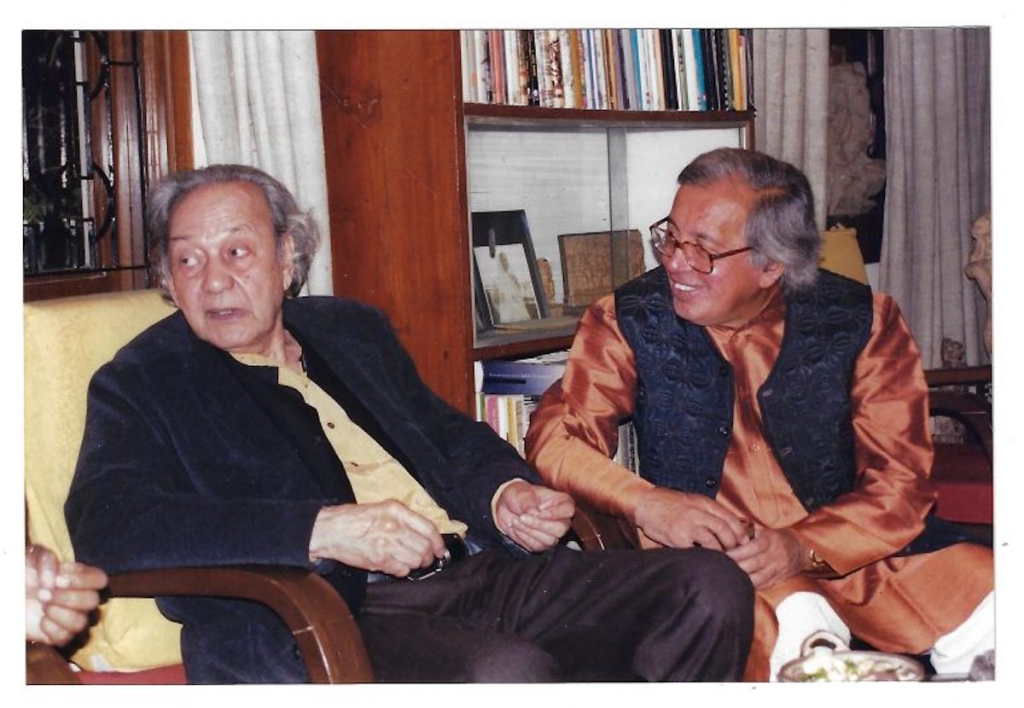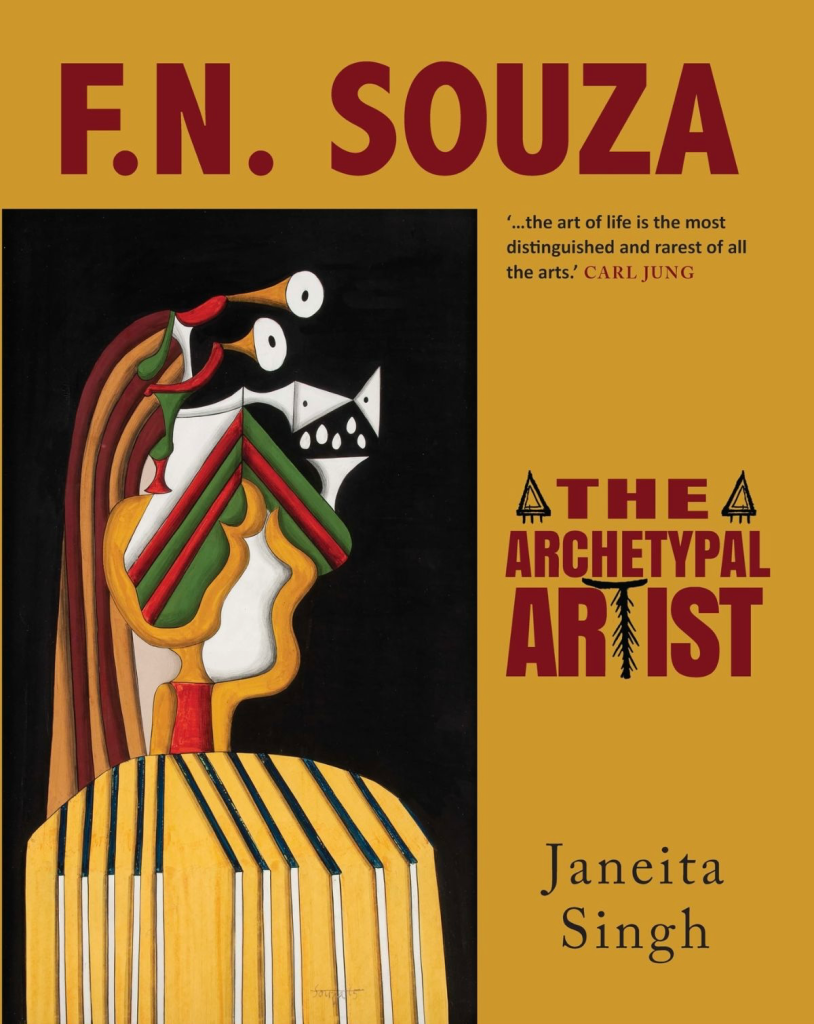Witnessing Imran Kokiloo’s ‘You Ran Away’
I. The Empty Room
You enter an empty room. White walls hold nothing but light and air. The city’s cacophony remains outside, muffled beyond the threshold. In this deliberate void, you wait—though for what, you don’t yet know. Then, gradually, as if emerging from beneath water, sounds surface. Voices. Familiar in their cadence if not their words, belonging to languages of the subcontinent. Someone is saying something. Softly. To someone else. Sometimes muffled, as if traveling through layers of time rather than space.
This is how Imran Kokiloo’s You Ran Away begins—not as spectacle but as séance.
II. The Halo of Sound
We know Kokiloo primarily as a visual storyteller, a photographer and installation artist who captures what the eye can witness. But here, he trades the frame for frequency, the image for echo. You Ran Away is a 26-minute sound collage that transforms human voices into instruments of memory itself. Stories, lullabies, songs, poems, chants—all of them leave what one might call a halo behind. The light of sound.
Milan Kundera wrote that the struggle of man against power is the struggle of memory against forgetting. In this white room at PHOTOINK gallery, that struggle becomes audible. With eyes closed, you sense many things: the memory of some other time, some other space. Memory as heard. As imagined. The lost spaces and lives that cling, reclaim, linger—in spite of everything, nevertheless.
III. The Language of Birds
When we listen to languages we don’t know, we return to something primal. The sounds become like birdsong—alien yet somehow intelligible in their emotional architecture. This is how language must have first traveled: as pure sound, before meaning calcified around syllables. In this state, sound becomes its own language, its own logic.
Through Kokiloo’s composition, we overhear another world across the walls of our not-knowing. But we sense something deeper: the humanness of it. The breath between words. The catch in the throat. The weight of what cannot quite be said. The pregnant pause. The telling.
Audiofile Courtesy: Artist: Imran Kokiloo | Recorded & Produced at: Reverb Studios | Mix & Master: Imran Latief |Atmos & 5.1 Surround Mix Engineer: Pratik Biswas
IV. The Weave of Witness
The title itself—You Ran Away—translates tcholhama, a word commonly used by poets in Kashmiri. It functions as a writer’s plea, oscillating between longing and loss. Yet this is no simple expression of abandonment or despair. As an element of song, as lyrical refrain, tcholhama always carries within it the possibility of return.
The piece opens with Rahman Rahi’s 1970 nazm, “Baas,” which portrays winter’s bleakness as metaphor for both personal and collective condition. From there, it moves through a transgenerational lament: the sublime lyrics of Ghulam Ahmad Mahjoor, the invocations of Habba Khatoon, Ghani Kashmiri, Mahmud Gami, Arinmal, Abdul Rahim Sopori, Abdul Ahad Azad. The spiritual shrukhs and vaakhs of Nund Ryosh and Lal Dyad anchor the progression, reminding us of roots that run deeper than history can measure.
This is a weave that evokes different visuals in different people. What you take away depends on what you bring. The experience resists easy categorization—it is mystique and ordinary, precious and collective, all at once.
V. The Stillness of Listening
There is not much to see when you open your eyes in that white room. The artwork refuses the visual. Yet seated there, listening to waves of sound washing over you one after another, you become more still than you usually are. More calm. The metropolis continues to blare its screeches outside the studio, but inside, time moves differently.
This is not a celebration. It is a witness. An accounting of what happened in the presence of those who remember, who carry these songs forward. For all Kashmiris. And for the rest of us, who listen from the outside.
VI. The Space Between
The gallery provides an information pack that contextualizes the work—names, dates, historical frameworks. But perhaps this scaffolding is not entirely necessary. Perhaps You Ran Away is designed to take each audience member into their own realm of description, their own act of telling.
What matters is what happens in the room. The parallax movement of words, memories, time, and spaces condensed into 26 minutes of human voices sharing something that refuses singular definition. You return with a strum. An opening. A closing. And most importantly, an empty space—the kind that lingers after sound has passed, in the moment which has just gone.
VII. The Hope of Return
Sound, unlike image, cannot be possessed. It exists only in its passing, in the act of listening. This transience mirrors the themes that Kokiloo explores: displacement, memory, the ache of what is no longer present. Yet within that transience lives its opposite—persistence. These voices, these songs, these utterances have survived. They have been carried forward, body to body, breath to breath.
You Ran Away is an archaeology of sound, yes. But it is also an act of insistence. The work gives voice to an inherited subconscious, reflecting the psyche as what Kokiloo calls “a sonorous ecology”—a living system of resonances, where nothing is truly lost because everything echoes.
In the end, you leave the white room changed in ways difficult to articulate. You carry with you not facts or images, but frequencies. Vibrations. The feeling of having overheard something essential—a transmission from some other time that is simultaneously this time, now, always.
The struggle of memory against forgetting continues. But in that white room, for 26 minutes, memory wins.
Imran Kokiloo’s “You Ran Away” is currently being exhibited at PHOTOINK gallery. The work stands as a meditation on loss and longing, desertion and faith—an encompassing cycle that moves from despair toward something that might, however subdued, be called hope.
A journalist by profession, Nidheesh Tyagi is the Co-founder of Abir Space and Abir Pothi. He is a poet and a story teller.





